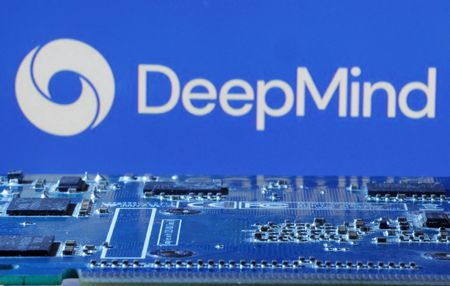
FILE PHOTO: Illustration shows Google DeepMind logo
By Martin Coulter
LONDON (Reuters) – Google Deepmind has unveiled the third major version of its “AlphaFold” artificial intelligence model, designed to help scientists design drugs and target disease more effectively.
In 2020, the company made a significant advance in molecular biology by using AI to successfully predict the behaviour of microscopic proteins.
With the latest incarnation of AlphaFold, researchers at DeepMind and sister company Isomorphic Labs – both overseen by cofounder Demis Hassabis – have mapped the behaviour for all of life’s molecules, including human DNA.
The interactions of proteins – from enzymes crucial to the human metabolism, to the antibodies that fight infectious diseases – with other molecules is key to drug discovery and development.
DeepMind said the findings, published in research journal Nature on Wednesday, would reduce the time and money needed to develop potentially life-changing treatments.
“With these new capabilities, we can design a molecule that will bind to a specific place on a protein, and we can predict how strongly it will bind,” Hassabis said in a press briefing on Tuesday.
“It’s a critical step if you want to design drugs and compounds that will help with disease.”
The company also announced the release of the “AlphaFold server”, a free online tool that scientists can use to test their hypotheses before running real-world tests.
Since 2021, AlphaFold’s predictions have been freely accessible to non-commercial researchers, as part of a database containing more than 200 million protein structures, and has been cited thousands of times in others’ work.
DeepMind said the new server required less computing knowledge, allowing researchers to run tests with just a few clicks of a button.
John Jumper, a senior research scientist at DeepMind, said: “It’s going to be really important how much easier the AlphaFold server makes it for biologists – who are experts in biology, not computer science – to test larger, more complex cases.”
Dr Nicole Wheeler, an expert in microbiology at the University of Birmingham, said AlphaFold 3 could significantly speed up the drug discovery pipeline, as “physically producing and testing biological designs is a big bottleneck in biotechnology at the moment”.
(Reporting by Martin Coulter; Editing by Sharon Singleton)





